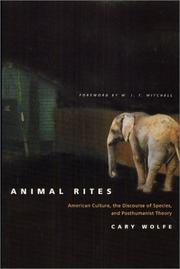| Listing 1 - 3 of 3 |
Sort by
|

ISBN: 0226905144 9780226905143 0226905136 9780226905136 9786612932953 0226905128 1282932950 Year: 2003 Publisher: Chicago University of Chicago Press
Abstract | Keywords | Export | Availability | Bookmark
 Loading...
Loading...Choose an application
- Reference Manager
- EndNote
- RefWorks (Direct export to RefWorks)
In Animal Rites, Cary Wolfe examines contemporary notions of humanism and ethics by reconstructing a little known but crucial underground tradition of theorizing the animal from Wittgenstein, Cavell, and Lyotard to Lévinas, Derrida, Žižek, Maturana, and Varela. Through detailed readings of how discourses of race, sexuality, colonialism, and animality interact in twentieth-century American culture, Wolfe explores what it means, in theory and critical practice, to take seriously "the question of the animal."
Animal rights --- Species --- Humanism --- Human-animal relationships in literature --- Human-animal relationships in motion pictures --- Culture in motion pictures --- Philosophy --- Humanism. --- Human-animal relationships in literature. --- Human-animal relationships in motion pictures. --- Philosophy. --- Motion pictures --- Classical education --- Classical philology --- Philosophical anthropology --- Renaissance --- Speciation (Biology) --- Biology --- Genetics --- Hybridization --- Organisms --- Animal liberation --- Animals' rights --- Rights of animals --- Animal welfare --- Moral and ethical aspects --- Animal rights - Philosophy --- Species - Philosophy --- animal behavior, carnism, posthumanism, species, ethics, humanism, race, sexuality, animality, colonialism, philosophy, varela, maturana, zizek, derrida, levinas, lyotard, cavell, wittgenstein, ecology, rights, language, sacrifice, psychology, gender, hemingway, congo, silence of the lambs, michael crichton, nonfiction, zoology, anthropocentrism, other.

ISBN: 128196641X 9786611966416 0226738701 9780226738703 9781281966414 0226738671 6611966412 9780226738673 Year: 2005 Publisher: Chicago University of Chicago Press
Abstract | Keywords | Export | Availability | Bookmark
 Loading...
Loading...Choose an application
- Reference Manager
- EndNote
- RefWorks (Direct export to RefWorks)
Jeffrey Dahmer. Ted Bundy. John Wayne Gacy. Over the past thirty years, serial killers have become iconic figures in America, the subject of made-for-TV movies and mass-market paperbacks alike. But why do we find such luridly transgressive and horrific individuals so fascinating? What compels us to look more closely at these figures when we really want to look away? Natural Born Celebrities considers how serial killers have become lionized in American culture and explores the consequences of their fame. David Schmid provides a historical account of how serial killers became famous and how that fame has been used in popular media and the corridors of the FBI alike. Ranging from H. H. Holmes, whose killing spree during the 1893 Chicago World's Fair inspired The Devil in the White City, right up to Aileen Wuornos, the lesbian prostitute whose vicious murder of seven men would serve as the basis for the hit film Monster, Schmid unveils a new understanding of serial killers by emphasizing both the social dimensions of their crimes and their susceptibility to multiple interpretations and uses. He also explores why serial killers have become endemic in popular culture, from their depiction in The Silence of the Lambs and The X-Files to their becoming the stuff of trading cards and even Web sites where you can buy their hair and nail clippings. Bringing his fascinating history right up to the present, Schmid ultimately argues that America needs the perversely familiar figure of the serial killer now more than ever to manage the fear posed by Osama bin Laden since September 11. "This is a persuasively argued, meticulously researched, and compelling examination of the media phenomenon of the 'celebrity criminal' in American culture. It is highly readable as well."-Joyce Carol Oates
Serial murderers --- Crime in popular culture --- Serial murders in mass media. --- Fame. --- Celebrity --- Renown --- Glory --- Mass media --- Popular culture --- Multiple murderers --- Repetitive murderers --- Serial killers --- Murderers --- Public opinion. --- Serial murders in mass media --- Fame --- Public opinion --- Serial murderers - United States - Public opinion --- Crime in popular culture - United States --- serial killers, fame, celebrity, press, transgression, evil, murder, violence, masculinity, john wayne gacy, ted bundy, jeffrey dahmer, popular culture, horror, silence of the lambs, x files, prostitute, lesbian, aileen wuornos, gay, queer, lgbt, devil white city, 1893 worlds fair, hh holmes, nonfiction, history, biography, mass media, criminal, terrorism, bin laden, fear, consumerism, jack ripper, fbi, hollywood, normality, monstrosity, monster, film, television, true crime.
Book
ISBN: 1856284972 9781856284974 Year: 1993 Publisher: Aldershot Avebury
Abstract | Keywords | Export | Availability | Bookmark
 Loading...
Loading...Choose an application
- Reference Manager
- EndNote
- RefWorks (Direct export to RefWorks)
Sheep industry --- Wool --- Mutton --- Lamb (Meat) --- Price maintenance --- Prices --- Econometric models. --- 338.516 --- -Wool --- -Mutton --- -Lamb (Meat) --- -Price maintenance --- -Fair trade --- Maintenance of prices --- Price fixing, Resale --- Price stabilization, Industrial --- Resale price fixing --- Resale price maintenance --- Price fixing --- Lambs --- Meat --- Sheep --- Fleece --- Animal fibers --- Hair --- Animal industry --- Markt als prijsmechanisme. Marktmechanisme. Marktprijs. Vrije concurrentie. Monopolistische concurrentie. Oligipolie. Duopolie. Marginale prijsvorming --groothandel-kleinhandelprijs zie {339.3} --- -Econometric models --- Econometric models --- -Markt als prijsmechanisme. Marktmechanisme. Marktprijs. Vrije concurrentie. Monopolistische concurrentie. Oligipolie. Duopolie. Marginale prijsvorming --groothandel-kleinhandelprijs zie {339.3} --- 338.516 Markt als prijsmechanisme. Marktmechanisme. Marktprijs. Vrije concurrentie. Monopolistische concurrentie. Oligipolie. Duopolie. Marginale prijsvorming --groothandel-kleinhandelprijs zie {339.3} --- Fair trade --- Prices&delete& --- Sheep industry - Prices - Australia - Econometric models. --- Wool - Prices - Australia - Econometric models. --- Mutton - Prices - Australia - Econometric models. --- Lamb (Meat) - Prices - Australia - Econometric models. --- Price maintenance - Australia - Econometric models.
| Listing 1 - 3 of 3 |
Sort by
|

 Search
Search Feedback
Feedback About UniCat
About UniCat  Help
Help News
News